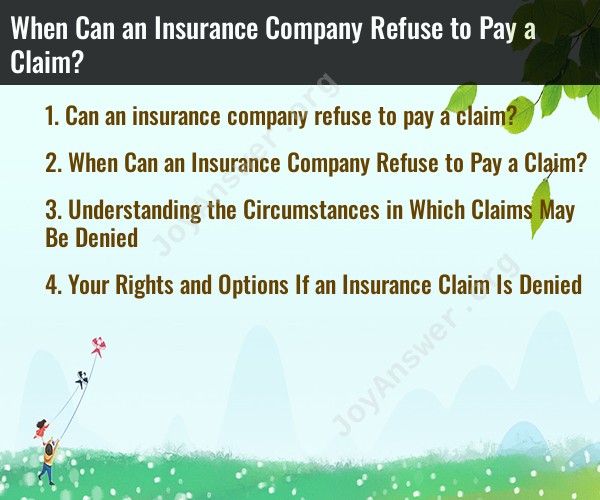Can an insurance company refuse to pay a claim?
Insurance companies can refuse to pay a claim under certain circumstances, and it's important to understand the reasons and conditions under which this can occur. Insurance policies are legal contracts, and both the policyholder and the insurance company have specific obligations and responsibilities. Here are common situations in which an insurance company may refuse to pay a claim:
Policy Exclusions: Insurance policies typically contain a list of exclusions, which are specific situations or types of losses that are not covered by the policy. If the claim falls into one of these excluded categories, the insurance company may deny the claim.
Non-Payment of Premiums: If the policyholder has not paid their insurance premiums as required by the policy, the insurance company may refuse to pay claims. It's essential to maintain timely premium payments to keep the policy in force.
Misrepresentation or Fraud: If the policyholder provides false or misleading information on their insurance application or during the claims process, it can be considered misrepresentation or fraud. In such cases, the insurance company may deny the claim.
Lack of Coverage: Sometimes, a policyholder may believe they have coverage for a particular type of loss, but the policy does not actually cover it. If the loss is not within the scope of coverage outlined in the policy, the insurance company may deny the claim.
Failure to Meet Policy Conditions: Insurance policies often come with specific conditions that must be met for a claim to be valid. If the policyholder fails to fulfill these conditions, the insurance company may deny the claim. For example, in health insurance, a policyholder may need pre-authorization for certain medical procedures.
Uninsured Parties: In auto insurance, if the responsible party in an accident is not insured or cannot be identified (e.g., a hit-and-run), the policyholder's insurance company may deny a claim.
Deductibles and Policy Limits: Policyholders are typically responsible for paying a deductible before the insurance coverage kicks in. If the cost of the loss is less than the deductible, the insurance company will not pay the claim. Additionally, if the loss exceeds the policy limits, the insurance company will only pay up to the limit, and the policyholder is responsible for any additional costs.
Delays in Notifying the Insurance Company: It's important to promptly notify the insurance company of a loss or claim. Delaying notification may give the insurance company grounds to deny the claim.
Act of War or Civil Disorder: Some insurance policies exclude coverage for losses related to war, civil disorder, or acts of terrorism.
Negligence or Failure to Prevent Loss: If the policyholder's negligence or failure to take reasonable precautions contributed to the loss, the insurance company may refuse to pay the claim. For example, in homeowner's insurance, if a house is left unattended for an extended period without proper security measures, the insurer may deny a claim for theft or damage.
It's essential to thoroughly understand your insurance policy, including its terms, conditions, exclusions, and limitations, to avoid claim denials. If your claim is denied and you believe it was wrongfully denied, you may have the option to appeal the decision or seek legal assistance to resolve the dispute.
When Can an Insurance Company Refuse to Pay a Claim?
There are a number of reasons why an insurance company may refuse to pay a claim. Some of the most common reasons include:
- Lack of coverage: The insurance company may deny a claim if the type of damage is not covered by the policy. For example, if you have a homeowner's insurance policy and your home is damaged by a flood, your insurance company may deny your claim if you do not have flood insurance.
- Exclusions: Insurance policies typically have a number of exclusions, which are types of damage that are not covered. For example, most homeowner's insurance policies exclude damage caused by earthquakes.
- Pre-existing conditions: If the damage was caused by a pre-existing condition, the insurance company may deny the claim. For example, if your car is damaged in an accident and the insurance company determines that the damage was caused by a pre-existing condition, such as a faulty brake caliper, the insurance company may deny your claim.
- Fraud: If the insurance company determines that you have committed fraud, such as filing a false claim or exaggerating the extent of the damage, the insurance company may deny the claim.
Understanding the Circumstances in Which Claims May Be Denied
It is important to understand the circumstances in which an insurance company may refuse to pay a claim so that you can avoid making mistakes that could jeopardize your claim.
For example, it is important to be honest and accurate when reporting the damage to your insurance company. If the insurance company determines that you have been dishonest or inaccurate in your reporting, they may deny your claim.
It is also important to cooperate with the insurance company's investigation. The insurance company may need to inspect the damage or interview witnesses in order to determine the cause of the damage and the extent of the loss. If you refuse to cooperate with the investigation, the insurance company may deny your claim.
Your Rights and Options If an Insurance Claim Is Denied
If your insurance claim is denied, you have a number of rights and options.
First, you can request a review of the decision. You can do this by writing to the insurance company and explaining why you believe the claim should be paid.
If you are not satisfied with the outcome of the review, you can file a complaint with your state insurance commissioner. The insurance commissioner can investigate the complaint and take action against the insurance company if it finds that the insurance company has violated the law.
You may also be able to file a lawsuit against the insurance company. However, it is important to note that lawsuits can be expensive and time-consuming.
If you are having difficulty resolving a dispute with your insurance company, you may want to contact an attorney who specializes in insurance law. An attorney can help you to understand your rights and options, and can represent you in negotiations, mediation, arbitration, or litigation.
Conclusion
It is important to understand the circumstances in which an insurance company may refuse to pay a claim so that you can avoid making mistakes that could jeopardize your claim. If your insurance claim is denied, you have a number of rights and options, including requesting a review of the decision, filing a complaint with your state insurance commissioner, or filing a lawsuit against the insurance company.













